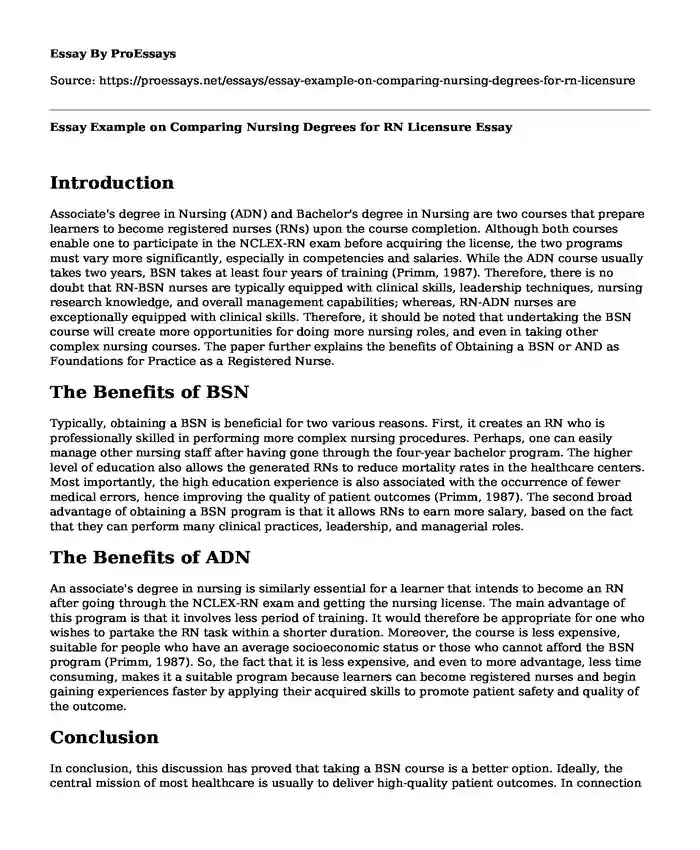Introduction
Associate's degree in Nursing (ADN) and Bachelor's degree in Nursing are two courses that prepare learners to become registered nurses (RNs) upon the course completion. Although both courses enable one to participate in the NCLEX-RN exam before acquiring the license, the two programs must vary more significantly, especially in competencies and salaries. While the ADN course usually takes two years, BSN takes at least four years of training (Primm, 1987). Therefore, there is no doubt that RN-BSN nurses are typically equipped with clinical skills, leadership techniques, nursing research knowledge, and overall management capabilities; whereas, RN-ADN nurses are exceptionally equipped with clinical skills. Therefore, it should be noted that undertaking the BSN course will create more opportunities for doing more nursing roles, and even in taking other complex nursing courses. The paper further explains the benefits of Obtaining a BSN or AND as Foundations for Practice as a Registered Nurse.
The Benefits of BSN
Typically, obtaining a BSN is beneficial for two various reasons. First, it creates an RN who is professionally skilled in performing more complex nursing procedures. Perhaps, one can easily manage other nursing staff after having gone through the four-year bachelor program. The higher level of education also allows the generated RNs to reduce mortality rates in the healthcare centers. Most importantly, the high education experience is also associated with the occurrence of fewer medical errors, hence improving the quality of patient outcomes (Primm, 1987). The second broad advantage of obtaining a BSN program is that it allows RNs to earn more salary, based on the fact that they can perform many clinical practices, leadership, and managerial roles.
The Benefits of ADN
An associate's degree in nursing is similarly essential for a learner that intends to become an RN after going through the NCLEX-RN exam and getting the nursing license. The main advantage of this program is that it involves less period of training. It would therefore be appropriate for one who wishes to partake the RN task within a shorter duration. Moreover, the course is less expensive, suitable for people who have an average socioeconomic status or those who cannot afford the BSN program (Primm, 1987). So, the fact that it is less expensive, and even to more advantage, less time consuming, makes it a suitable program because learners can become registered nurses and begin gaining experiences faster by applying their acquired skills to promote patient safety and quality of the outcome.
Conclusion
In conclusion, this discussion has proved that taking a BSN course is a better option. Ideally, the central mission of most healthcare is usually to deliver high-quality patient outcomes. In connection to the BSN course, the study has proven that a graduated RN-BSN nurse can reduce the medical errors, mortality rates and perform leadership and managerial roles, which cannot be done by an ADN-RN registered nurse.
Reference
Primm, P. L. (1987). Differentiated practice for ADN-and BSN-prepared nurses. Journal of Professional Nursing, 3(4), 218-225.
https://www.sciencedirect.com/science/article/pii/S875572238780008X.
Cite this page
Essay Example on Comparing Nursing Degrees for RN Licensure. (2023, Nov 20). Retrieved from https://proessays.net/essays/essay-example-on-comparing-nursing-degrees-for-rn-licensure
If you are the original author of this essay and no longer wish to have it published on the ProEssays website, please click below to request its removal:
- The Biological Impact of Drugs
- Essay Example on Psychiatric Mental Health Nursing
- Social Work in Reducing Recidivism Paper Example
- Healthy People 2020: An Overview - Essay Sample
- Planning for a Successful Life: Strategies to Overcome Uncertainties - Essay Sample
- Quarantine: An Essential Tool to Combat Contagious Diseases - Essay Sample
- COVID-19: US Economy in a Free Fall Amid Lockdown and Quarantine - Essay Sample







